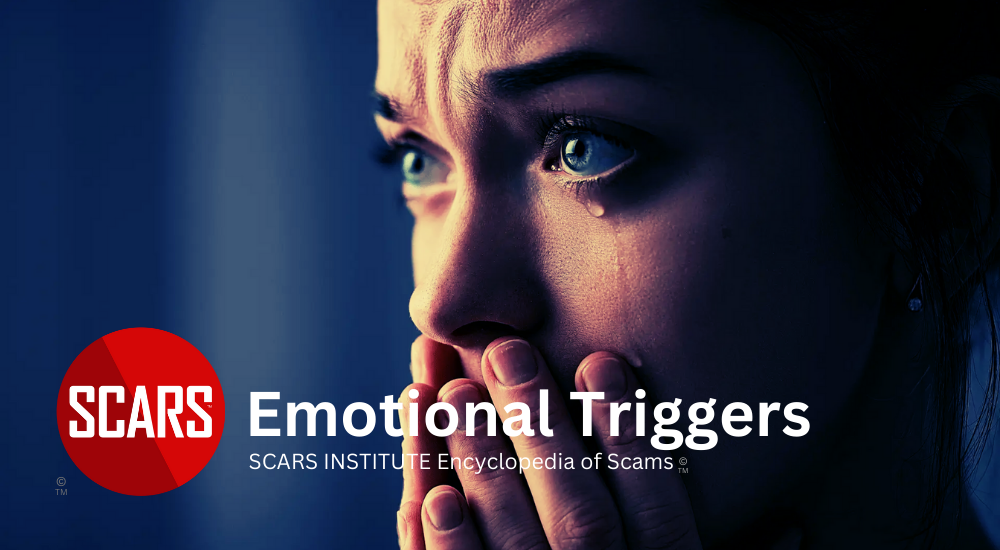
SCARS Institute’s Encyclopedia of Scams™ Published Continuously for 25 Years

Every Scam Victim Need To Tell Their Story
An excerpt from our upcoming SCARS Gold Book on Telling Your Story
First, understand that this is not going to be easy! But it is easier than hiding the secret inside!
By sharing your story you will reduce your trauma and improve your chances for a solid recovery!
How Can You Explain What Happened To Family And Friends? If you do this, no one should blame you. No one should shame you.
- The simplest explanation is the best explanation.
- They mostly want to know if you are alright!
- They will be concerned about your future stability!
- Be honest – do not conceal – but you can exclude
- Share your true emotional state! It begins with your initial preparation of the facts.
This is presented by SCARS Directors: Dr. Tim McGuinness and Debby Montgomery Johnson
Duration: 69 Minutes
Learn more about telling your story here: How To Explain It To Others
To learn more about the topics covered in this webinar visit:
- How To Explain It To Others
- Reporting Scammers – How To Tell Your Story To Your Local Police!
- 3 Steps For New Victims
- A Scam Victim’s Checklist
- Understanding Law Enforcement
- How Do You Get Closure?
- Why Reporting Matters?
- Reporting To The Local Police
- Reporting Romance Scams: Why Survivors Often Don’t
- 2022 Scam Update – A Podcast With Dr. Tim McGuinness And Debby Montgomery Johnson
- Psychology of Scams & Victim Trauma – Article Catalog
- Recovering from Scams – Article Catalog
- Information For Family & Friends – Article Catalog
- Money Mules & Money Laundering – Article Catalog
To learn more about who SCARS is visit www.AgainstScams.org To find a local counselor or therapist visit either: www.opencounseling.com and www.psychologytoday.com/us/therapists/trauma-and-ptsd If you are looking for a support group please contact us at: www.facebook.com/groups/SCARS.Avoidance.Information.Public.Group
-/ 30 /-
What do you think about this?
Please share your thoughts in a comment below!
LEAVE A COMMENT?
Recent Comments
On Other Articles
- Arwyn Lautenschlager on Love Bombing And How Romance Scam Victims Are Forced To Feel: “I was love bombed to the point that I would do just about anything for the scammer(s). I was told…” Feb 11, 14:24
- on Dani Daniels (Kira Lee Orsag): Another Scammer’s Favorite: “You provide a valuable service! I wish more people knew about it!” Feb 10, 15:05
- on Danielle Delaunay/Danielle Genevieve – Stolen Identity/Stolen Photos – Impersonation Victim UPDATED 2024: “We highly recommend that you simply turn away form the scam and scammers, and focus on the development of a…” Feb 4, 19:47
- on The Art Of Deception: The Fundamental Principals Of Successful Deceptions – 2024: “I experienced many of the deceptive tactics that romance scammers use. I was told various stories of hardship and why…” Feb 4, 15:27
- on Danielle Delaunay/Danielle Genevieve – Stolen Identity/Stolen Photos – Impersonation Victim UPDATED 2024: “Yes, I’m in that exact situation also. “Danielle” has seriously scammed me for 3 years now. “She” (he) doesn’t know…” Feb 4, 14:58
- on An Essay on Justice and Money Recovery – 2026: “you are so right I accidentally clicked on online justice I signed an agreement for 12k upfront but cd only…” Feb 3, 08:16
- on The SCARS Institute Top 50 Celebrity Impersonation Scams – 2025: “Quora has had visits from scammers pretending to be Keanu Reeves and Paul McCartney in 2025 and 2026.” Jan 27, 17:45
- on Scam Victims Should Limit Their Exposure To Scam News & Scammer Photos: “I used to look at scammers photos all the time; however, I don’t feel the need to do it anymore.…” Jan 26, 23:19
- on After A Scam, No One Can Tell You How You Will React: “This article was very informative, my scams happened 5 years ago; however, l do remember several of those emotions and/or…” Jan 23, 17:17
- on Situational Awareness and How Trauma Makes Scam Victims Less Safe – 2024: “I need to be more observant and I am practicing situational awareness. I’m saving this article to remind me of…” Jan 21, 22:55
ARTICLE META
Important Information for New Scam Victims
- Please visit www.ScamVictimsSupport.org – a SCARS Website for New Scam Victims & Sextortion Victims
- Enroll in FREE SCARS Scam Survivor’s School now at www.SCARSeducation.org
- Please visit www.ScamPsychology.org – to more fully understand the psychological concepts involved in scams and scam victim recovery
If you are looking for local trauma counselors please visit counseling.AgainstScams.org or join SCARS for our counseling/therapy benefit: membership.AgainstScams.org
If you need to speak with someone now, you can dial 988 or find phone numbers for crisis hotlines all around the world here: www.opencounseling.com/suicide-hotlines
A Note About Labeling!
We often use the term ‘scam victim’ in our articles, but this is a convenience to help those searching for information in search engines like Google. It is just a convenience and has no deeper meaning. If you have come through such an experience, YOU are a Survivor! It was not your fault. You are not alone! Axios!
A Question of Trust
At the SCARS Institute, we invite you to do your own research on the topics we speak about and publish, Our team investigates the subject being discussed, especially when it comes to understanding the scam victims-survivors experience. You can do Google searches but in many cases, you will have to wade through scientific papers and studies. However, remember that biases and perspectives matter and influence the outcome. Regardless, we encourage you to explore these topics as thoroughly as you can for your own awareness.
Statement About Victim Blaming
SCARS Institute articles examine different aspects of the scam victim experience, as well as those who may have been secondary victims. This work focuses on understanding victimization through the science of victimology, including common psychological and behavioral responses. The purpose is to help victims and survivors understand why these crimes occurred, reduce shame and self-blame, strengthen recovery programs and victim opportunities, and lower the risk of future victimization.
At times, these discussions may sound uncomfortable, overwhelming, or may be mistaken for blame. They are not. Scam victims are never blamed. Our goal is to explain the mechanisms of deception and the human responses that scammers exploit, and the processes that occur after the scam ends, so victims can better understand what happened to them and why it felt convincing at the time, and what the path looks like going forward.
Articles that address the psychology, neurology, physiology, and other characteristics of scams and the victim experience recognize that all people share cognitive and emotional traits that can be manipulated under the right conditions. These characteristics are not flaws. They are normal human functions that criminals deliberately exploit. Victims typically have little awareness of these mechanisms while a scam is unfolding and a very limited ability to control them. Awareness often comes only after the harm has occurred.
By explaining these processes, these articles help victims make sense of their experiences, understand common post-scam reactions, and identify ways to protect themselves moving forward. This knowledge supports recovery by replacing confusion and self-blame with clarity, context, and self-compassion.
Additional educational material on these topics is available at ScamPsychology.org – ScamsNOW.com and other SCARS Institute websites.
Psychology Disclaimer:
All articles about psychology and the human brain on this website are for information & education only
The information provided in this article is intended for educational and self-help purposes only and should not be construed as a substitute for professional therapy or counseling.
While any self-help techniques outlined herein may be beneficial for scam victims seeking to recover from their experience and move towards recovery, it is important to consult with a qualified mental health professional before initiating any course of action. Each individual’s experience and needs are unique, and what works for one person may not be suitable for another.
Additionally, any approach may not be appropriate for individuals with certain pre-existing mental health conditions or trauma histories. It is advisable to seek guidance from a licensed therapist or counselor who can provide personalized support, guidance, and treatment tailored to your specific needs.
If you are experiencing significant distress or emotional difficulties related to a scam or other traumatic event, please consult your doctor or mental health provider for appropriate care and support.
Also read our SCARS Institute Statement about Professional Care for Scam Victims – click here to go to our ScamsNOW.com website.


![SCARS Webinar: Telling Your Story Part 2 - Telling Your Family & Friends [VIDEO] fbi anti scam info fbi-anti-scam-info](https://romancescamsnow.com/wp-content/uploads/2020/12/fbi-anti-scam-info.png)
![SCARS Webinar: Telling Your Story Part 2 - Telling Your Family & Friends [VIDEO] how scams work a scars series How Scams Work - A SCARS Series on RomanceScamsNOW.com](https://romancescamsnow.com/wp-content/uploads/2021/05/how-scams-work-a-scars-series.png)
![SCARS Webinar: Telling Your Story Part 2 - Telling Your Family & Friends [VIDEO] Slide2 2 How To Tell Your Story - Part 2](https://romancescamsnow.com/wp-content/uploads/2022/04/Slide2-2.png)
![SCARS Webinar: Telling Your Story Part 2 - Telling Your Family & Friends [VIDEO] come and join 2 SCARS Institute Scam Survivor's Community portal banner](https://romancescamsnow.com/wp-content/uploads/2025/12/come-and-join-2.png)

![United States Military ID Cards - How To Spot Fakes - [UPDATED 2025] fake military id cards United States Military ID Cards - How To Spot Fakes - [UPDATED 2025] - on the SCARS Institute RomanceScamsNOW.com - the Encyclopedia of Scams™](https://romancescamsnow.com/wp-content/uploads/2022/03/fake-military-id-cards.png)




![SCARS Webinar: Telling Your Story Part 2 - Telling Your Family & Friends [VIDEO] SCARS CDN REPORT SCAMEMRS HERE e1697414569935 SCARS-CDN-REPORT-SCAMEMRS-HERE](https://romancescamsnow.com/wp-content/uploads/2018/12/SCARS-CDN-REPORT-SCAMEMRS-HERE-e1697414569935.png?_t=1697414571)
![SCARS Webinar: Telling Your Story Part 2 - Telling Your Family & Friends [VIDEO] NavyLogo@4x 81 U.S. & Canada Suicide Lifeline 988](https://romancescamsnow.com/wp-content/uploads/2023/06/NavyLogo@4x-81.png)

![SCARS Webinar: Telling Your Story Part 2 - Telling Your Family & Friends [VIDEO] niprc1.png1 150x1501 11 SCARS Webinar: Telling Your Story Part 2 - Telling Your Family & Friends [VIDEO] niprc1.png1 150x1501 11](https://scamsnow.com/wp-content/uploads/2025/04/niprc1.png1_-150x1501-11.webp)
Thank you for your comment. You may receive an email to follow up. We never share your data with marketers.